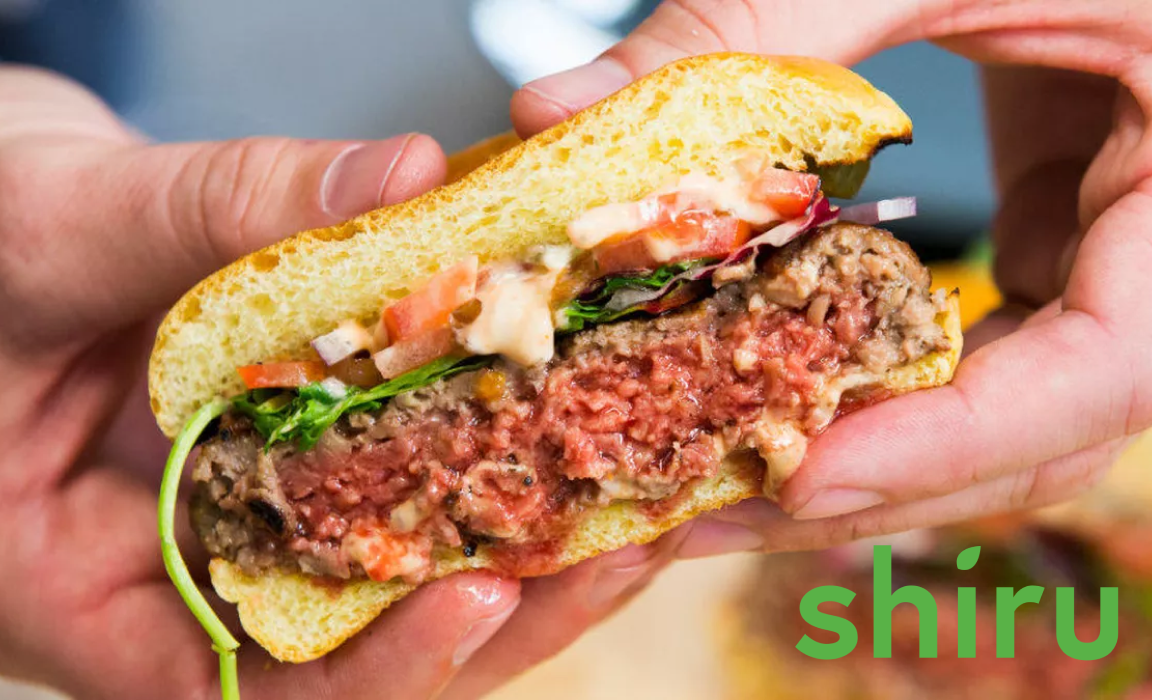Five years ago no one knew what an Impossible burger was, now it’s in every major grocery store and an item on Burger King’s menu. The alternative protein industry has been growing rapidly in recent years, this is in the context of the worldwide commitment to reducing carbon footprints in an effort to fight global warming. According to an assessment by the International Livestock Research Institute, animal agriculture now occupies more than 45% of the land surface on Earth. Livestock accounts for about 14.5% of total greenhouse gas emissions. “I truly believe that given the current circumstances… [with] climate change, in the near term, potentially ten years, we’re going to see a global food crisis happen,” predicts Jasmin Hume, Founder and CEO of Shiru.
That’s why Jasmin, a Ph.D. in Protein Engineering from NYU, is heading Shiru to solve this issue. Jasmin was originally from New York City and has a background in Chemical Engineering and Material Science. Jasmin started her first startup at NYU, BenchPals, which develops laboratory management software designed to make daily administrative tasks easier and less time-consuming. “My co-founders and I at the time joined the first edition of Summer Launchpad [at NYU],” recalls Jasmin, “…we got a taste of… how to do customer discovery and testing product-market fit, and some fundamentals of building early-stage startups.” BenchPals led Jasmin to a role at the NYC-based, deeptech focused VC firm Lux Capital the following summer, which showed her the VC side of the startup world. After getting her Ph.D. at NYU, Jasmin worked at Hampton Creek (later rebranded to JUST Inc.) as the Director of Food Chemistry for a few years. She learned the intricacies of the Food Industry there, paired with her technical background in Protein Engineering, Jasmin decided to start Shiru in June 2019.
Shiru is an ingredients company that leverages bioinformatics, artificial intelligence, and machine learning to create new protein ingredients. “In particular, we’re interested in replacing ingredients that have a large negative effect on the environment,” Jasmin explains, “so things like… dairy proteins, egg proteins, collagen, [and] gelatin.” Jasmin found that these livestock-reliant proteins usually aren’t the main components of what they’re used for – milk and eggs are used for spongy white bread for the texture, not for the nutritional value. “Those ingredients have a huge toll on the environment, and the textures can be achieved in other ways, specifically by novel proteins,” describes Jasmin. With the idea for Shiru, Jasmin applied to and was graduated from YCombinator in the summer of 2019. That gave Jasmin a small amount of capital to start putting together the Shiru team and go into product development.
Since then, Shiru has grown to a team of 24. Ten of which are Ph.D.’s. “The first phase of the business was actually proving the technology in a lab… which requires very, very specialized, highly technical people… and the appropriate lab space and equipment,” Jasmin explains. This is for a reason: Shiru’s core technology is what sets it apart from competitors. At Shiru, Jasmin and her team use several innovative biotechnology methods to “reverse engineer” the plant-based protein substitute from the ingredients. To put in simple terms, Shiru identifies the quality of an animal-based ingredient that makes it ideal for the texture required for the recipe – emulsification, gelling, solubility, sponginess, moisture content, etc. – and uses a cutting edge method called “high-throughput screening” to find an alternative in the plant-based world.
High-throughput screening (HTS) is basically a process that uses advanced machine learning to analyze the over 500 million unique protein sequences that exist in databases today. The process involves chemical assays, robotic equipment, and software to screen for the ideal protein sequence in a matter of days or weeks, instead of over years of research. This dramatically reduces Shiru’s workflow in identifying plant-based protein alternatives and ensures an exact match of protein quality in the alternative when compared to the original, all at a lower environmental cost.
After the protein alternative is identified through HTS, Shiru uses another frontier technology called “precision fermentation” to produce the plant-based protein. Fermentation is a process known to humans for generations, where glucose is fed to micro-organisms and alcohol, for example, is produced. “But in our case, it’s protein,” Jasmin specifies, “we feed [the micro-organisms] sugar, and they produce the exact ingredients that we program them to.” That’s why it’s called “precision fermentation”, Jasmin and her team at Shiru have developed a protein-specific fermentation process that allows for production to be measured in tons at scale.
With these patent-pending technologies, Shiru has developed a product catalog consisting of dairy, eggs, meats, and others. Shiru plans to sell these ingredients to a large audience of food producers like flour, sugar, or egg suppliers do, and scaling up operations will help achieve that. “We’re a few years off from being able to deliver the right quantities,” Jasmin admits, “and so [right now] we’re engaging with industry partners, in ways that are different from [our retail] model, which includes technology licensing.”
With this goal in mind, Jasmin just closed a $17M Series A in October of 2021 led by S2G Ventures, with CPT Capital, Y Combinator, Emles Venture Partners, The W Fund, SALT, Veronorte, and Lux Capital – who led Shiru’s $3.5M Seed Round in 2019 – also participating in the round. “We’re essentially using the fund to reach the next level of scale,” Jasmin describes, “we’re building out a pilot facility here in the East Bay in California to be able to produce much larger samples of our ingredients, in addition to continue building a technology infrastructure in our team.” The round puts Shiru’s funding to date to $20.5M, which lands the startup a $59M post-money valuation.
Jasmin tells me that five years down the line, she expects Shiru to have numerous ingredients on the market that deliver real impact for the consumers in terms of nutrition, functionality, and replace the need for animal-based ingredients to appear on ingredient labels at all. In ten years, Jasmin wants Shiru to ensure food security globally. “We’re positioning Shiru to have a real impact to be able to make food that’s nutritious and sustainable globally,” summarizes Jasmin.
Just through my brief interview with Jasmin, I could tell that Shiru is a very mission-focused startup. When I asked her for advice to NYU’s aspiring entrepreneurs, her response was “be bold about the message that you take, and really surround yourself with people who are equally as motivated as you are, who really believes in your mission, and are really really really smart”. Shiru caught an opportunity of a lifetime as climate-tech becomes the new favorite of VC – Bill Gates recently said that climate-tech will produce “8 to 10 Teslas, a Google, an Amazon, and a Microsoft”. With the world turning greener every day, Shiru might just be the next generation food company.

